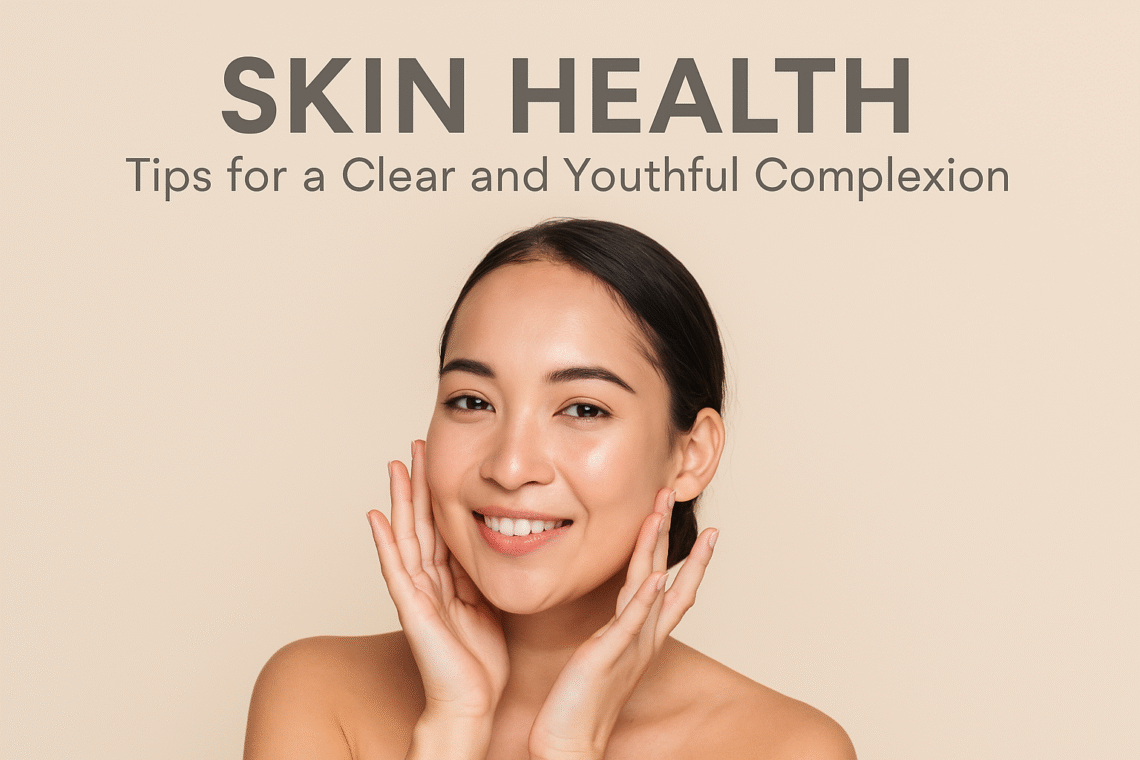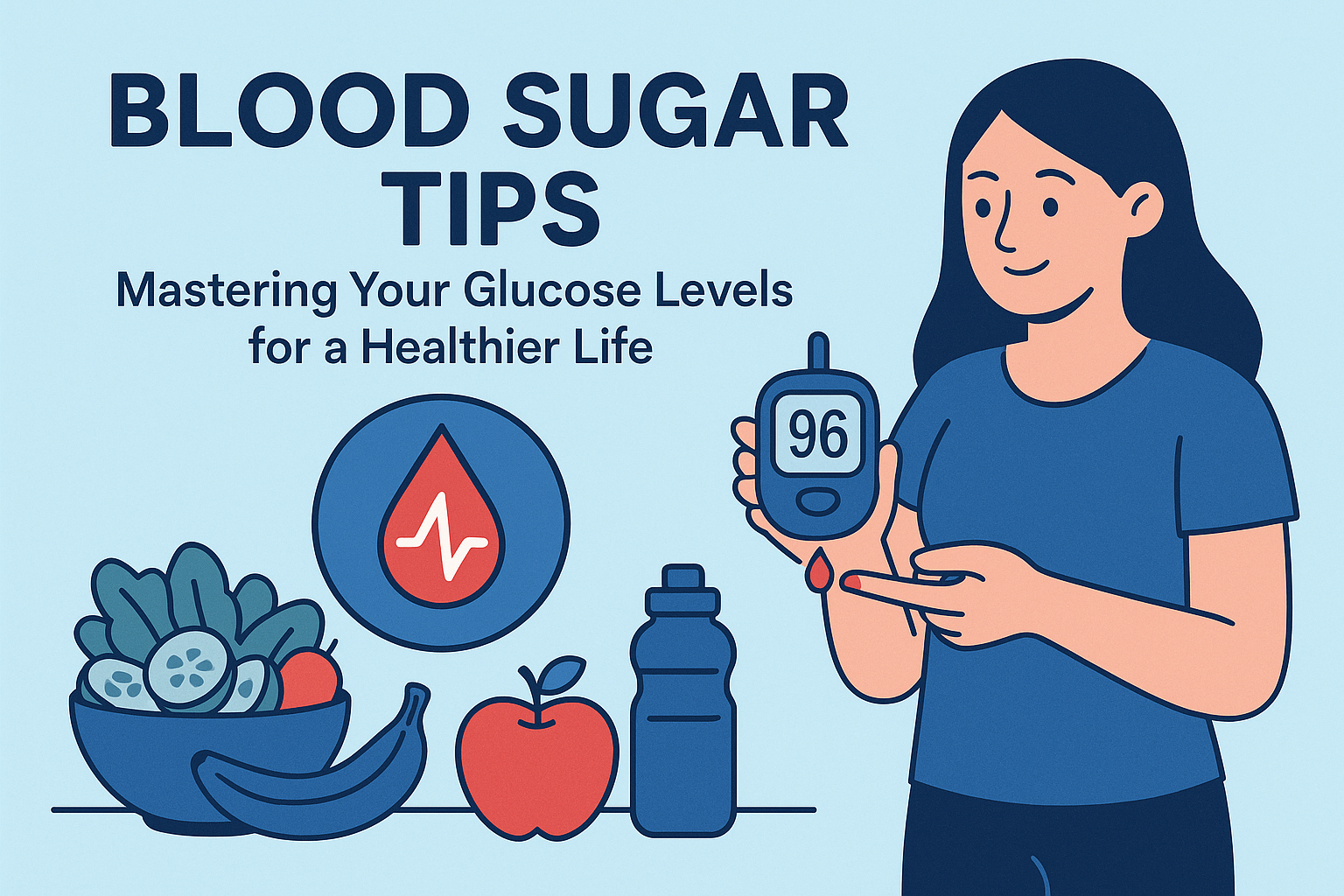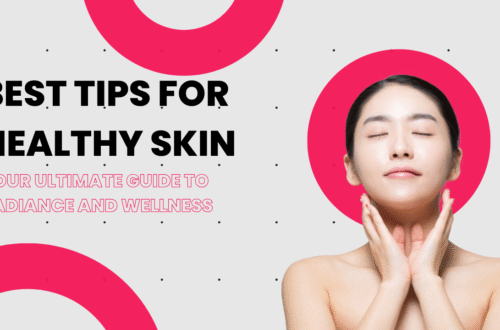Introduction: Why Skin Health Matters
Your skin is your body’s largest and most visible organ, playing a vital role in your overall health and well-being. It acts as a protective shield against environmental threats like bacteria, chemicals, temperature fluctuations, and UV rays. Healthy skin does more than guard your body—it also reflects internal balance and wellness. When your skin looks radiant and clear, it often signals that your body is functioning well. On the other hand, irritated or dull skin may point to stress, poor nutrition, or lifestyle habits that need attention.
Achieving and maintaining good skin health is not just about using expensive beauty products or following the latest trends. It involves a holistic approach that includes a consistent skincare routine, nutrient-rich diet, proper hydration, sufficient sleep, and stress management. These practices work together to nourish your skin from within, support repair, and prevent common issues like acne, dryness, and premature aging.
In this complete guide to skin health, you’ll learn how to identify your skin type, manage common skin concerns, and apply the most effective habits backed by science. Whether you’re looking to enhance your glow, reduce inflammation, or protect against aging, these strategies will help you create a sustainable plan for lifelong skin wellness.
Understanding Skin: Structure and Function

Your skin has three primary layers:
- Epidermis: The outermost layer, which acts as a waterproof shield and creates your skin tone.
- Dermis: The middle layer containing hair follicles, sweat glands, connective tissue, and blood vessels.
- Hypodermis (Subcutaneous Layer): The innermost layer composed of fat and connective tissue that helps insulate the body.
The skin performs several vital functions:
- Protection from pathogens and toxins
- Temperature regulation
- Sensory reception
- Wound healing
- Synthesis of Vitamin D
Each layer plays a key role in maintaining skin integrity, hydration, and elasticity.
Common Skin Types and Conditions
Skin Types:
- Normal: Balanced oil and moisture levels
- Dry: Lacks moisture and can appear flaky or rough
- Oily: Excess sebum production, prone to acne and shine
- Combination: Mix of dry and oily areas
- Sensitive: Easily irritated by products, temperature, or environment
Common Conditions:
- Acne
- Eczema (Atopic Dermatitis)
- Rosacea
- Psoriasis
- Hyperpigmentation
- Premature Aging
Understanding your skin type and any specific concerns is essential for building an effective skincare routine.
Top 8 Tips for Skin Health
1. Cleanse Gently but Effectively
Using a gentle, pH-balanced cleanser is one of the best steps you can take to support your overall skin health. Our skin has a natural protective barrier that helps keep moisture in and harmful bacteria out. Harsh soaps or over-cleansing can disrupt this barrier, leaving your skin dry, irritated, or more prone to breakouts.
For optimal skin health, choose a cleanser that’s specifically formulated to match your skin’s natural pH level, which is slightly acidic. A good pH-balanced product removes excess dirt, oil, and makeup without stripping away your skin’s essential oils. This helps maintain hydration and prevents sensitivity, redness, or flaking that often result from using the wrong products.
Establishing a consistent skincare routine with the right cleanser can significantly improve your complexion. Wash your face once in the morning and once at night. Always follow cleansing with a moisturizer to lock in hydration. For better skin health, avoid products with alcohol, sulfates, or strong fragrances. A balanced cleansing routine is a simple yet powerful way to promote clear, smooth, and healthy-looking skin every day.
Tip: Cleanse twice daily—once in the morning and once before bed.
2. Moisturize Daily

Hydration plays a vital role in maintaining optimal skin health. Water supports the skin’s elasticity, helping it stay firm, plump, and youthful-looking. When the skin lacks moisture, it becomes more prone to dryness, flakiness, irritation, and premature wrinkles. Drinking enough water throughout the day keeps the skin hydrated from within and supports overall cellular function, which is essential for a glowing complexion.
Contrary to popular belief, even oily skin requires proper hydration. Skipping moisturizers or drinking less water can actually make oily skin worse. When the skin senses dryness, it may produce even more sebum to compensate, leading to clogged pores and breakouts. By using lightweight, water-based moisturizers and staying well-hydrated, you can achieve a healthy oil-water balance and maintain clearer skin.
To enhance skin health, make hydration a part of your daily skincare and lifestyle routine. Use gentle, hydrating cleansers and apply moisturizers suited to your skin type. Include water-rich foods like cucumbers, oranges, and watermelon in your diet. Aim for at least 8–10 glasses of water per day. Staying hydrated not only improves the skin’s appearance but also boosts its natural barrier function—keeping it resilient, smooth, and radiant for years to come.
Look for: Ingredients like hyaluronic acid, glycerin, ceramides, and aloe vera.
Tip: Apply moisturizer immediately after cleansing to lock in moisture.
3. Protect Against UV Damage
Maintaining skin health begins with choosing the right cleanser. A mild, pH-balanced cleanser is essential for removing dirt, oil, and makeup without harming the skin’s natural barrier. Your skin’s outer layer acts as a shield, and using harsh soaps or over-washing can damage it. This disruption often leads to dryness, redness, irritation, or breakouts, which are all signs that your skin health may be compromised.
A pH-balanced cleanser is designed to match your skin’s natural acidity, helping to maintain its moisture and protective functions. Unlike products that contain sulfates or alcohol, gentle cleansers clean effectively without stripping away your skin’s natural oils. These oils are crucial in keeping your skin soft, hydrated, and resilient against environmental stressors.
For optimal skin health, wash your face twice daily—once in the morning and again before bedtime. Always follow cleansing with a good moisturizer to lock in hydration. If you wear makeup, ensure your cleanser is capable of removing all residue without the need for harsh scrubbing. A simple, gentle cleansing routine goes a long way in keeping your skin clear, calm, and glowing. Prioritizing the right skincare products sets the foundation for healthy, radiant skin over the long term.
Tip: Reapply sunscreen every 2 hours when outdoors, especially if swimming or sweating.
4. Eat Skin-Nourishing Foods
What you eat plays a powerful role in your overall skin health. A nutrient-rich diet not only benefits your body but also enhances the appearance, texture, and glow of your skin. Certain foods are loaded with antioxidants, vitamins, and healthy fats that help regenerate skin cells and protect against environmental damage.
For optimal skin health, focus on consuming foods high in antioxidants like berries, leafy greens, nuts, and green tea. These nutrients help fight free radicals—unstable molecules that contribute to aging and skin damage. Vitamins A, C, and E are especially important as they promote collagen production, brighten the complexion, and support the skin’s healing process.
Don’t forget healthy fats such as omega-3s found in salmon, chia seeds, and walnuts. These fats strengthen the skin barrier, retain moisture, and reduce redness or inflammation. Staying hydrated and limiting processed foods and sugars can also help prevent breakouts and dullness. A balanced diet rich in skin-friendly nutrients is a key foundation for achieving and maintaining glowing, youthful skin. When you nourish your body from the inside, it shows on the outside—making your diet a vital component of any effective skin health routine.
Best foods for skin:
- Berries (antioxidants)
- Avocados (healthy fats)
- Fatty fish (omega-3)
- Leafy greens (vitamins A, C, K)
- Nuts and seeds (zinc, vitamin E)
5. Stay Hydrated

Drinking enough water each day is one of the most underrated but powerful ways to support your skin health. Proper hydration helps maintain skin elasticity, making your skin look plump, smooth, and youthful. When your body is dehydrated, your skin may appear dry, flaky, or tight—leading to an increased risk of fine lines and dullness.
Water also plays a key role in flushing out toxins from your system. When your body eliminates waste efficiently, it reflects on your skin with fewer breakouts and a clearer complexion. Staying hydrated supports the skin’s natural repair processes, including cell regeneration and healing from environmental stressors like sun exposure and pollution.
To improve skin health, aim to drink at least 8 glasses of water a day. If you exercise or live in a hot climate, you may need even more. Include water-rich foods like cucumbers, oranges, and watermelon in your diet for an added hydration boost. Consistent water intake helps your skin stay supple, resilient, and glowing from the inside out. A simple habit like drinking more water can make a big difference in achieving healthy, radiant skin.
Tip: Aim for at least 8 glasses (2 liters) of water per day, more if you’re active or live in a hot climate.
6. Get Quality Sleep
Getting enough quality sleep is essential for good skin health. While you sleep, your body goes into repair mode, and your skin regenerates new cells, repairs damage from sun exposure and pollution, and produces collagen—a protein that helps keep your skin firm and youthful. Skimping on sleep interrupts this natural healing process, which can quickly show up on your face.
When you don’t get adequate rest, you may notice dark circles under your eyes, puffiness, and a dull complexion. Over time, chronic sleep deprivation can accelerate visible signs of aging, such as fine lines, sagging skin, and a tired appearance. That’s because your skin is unable to repair itself fully without the restorative effects of sleep.
To support skin health, aim for 7–9 hours of uninterrupted sleep each night. Develop a calming nighttime routine that includes turning off screens, lowering lights, and avoiding caffeine or heavy meals before bed. You can also benefit from using hydrating night creams or serums to support the skin’s repair process. Quality sleep doesn’t just leave you feeling refreshed—it also helps your skin look brighter, smoother, and more youthful. Prioritizing rest is a simple but powerful way to enhance your overall skin health.
Tip: Aim for 7-9 hours of quality sleep per night. Maintain a consistent sleep schedule and create a restful environment.
7. Manage Stress Levels
Chronic stress can take a serious toll on your overall well-being—and one of the most noticeable effects is on your skin health. When you’re under stress for long periods, your body produces more cortisol, the stress hormone. Elevated cortisol levels disrupt the skin’s natural balance, leading to increased oil production, clogged pores, and breakouts.
Beyond acne, stress can also cause flare-ups of inflammatory skin conditions like eczema, psoriasis, and rosacea. It can weaken your skin’s protective barrier, making it more sensitive and prone to redness, dryness, and irritation. Over time, this not only impacts the appearance of your skin but also its ability to repair and regenerate properly.
To support better skin health, managing stress should be a daily priority. Practice calming activities like meditation, yoga, or even a short walk outdoors. Make time for quality sleep and eat a balanced diet rich in vitamins and antioxidants. When you care for both your mental and physical health, your skin responds positively. Reducing chronic stress is one of the most effective ways to achieve clear, calm, and radiant skin naturally.
Tip: Practice stress-reducing activities like yoga, meditation, journaling, or spending time in nature.
8. Avoid Smoking and Limit Alcohol

Smoking and excessive alcohol consumption can have a serious impact on your skin health. Smoking reduces blood flow to the skin, limiting oxygen and essential nutrients that are needed to maintain a healthy, glowing complexion. Over time, this can lead to dullness, uneven skin tone, and premature wrinkles, especially around the mouth and eyes.
Alcohol, on the other hand, acts as a diuretic, which means it dehydrates the body—and your skin. Dehydration causes the skin to lose moisture and elasticity, leading to dryness, puffiness, and more visible fine lines. Alcohol also disrupts the skin’s natural barrier, making it more vulnerable to inflammation, breakouts, and irritation. These effects are even more severe when combined with a lack of sleep or poor nutrition.
Protecting your skin health involves more than just skincare products; it’s also about lifestyle choices. Reducing or eliminating smoking and limiting alcohol intake can make a noticeable difference in your skin’s texture, tone, and overall appearance. For better skin health, focus on staying hydrated, eating a balanced diet rich in antioxidants, and avoiding habits that speed up aging. Choosing a healthy lifestyle supports your skin from the inside out, helping you maintain a radiant, youthful look.
Tip: If you drink, do so in moderation and hydrate well afterward.
Skin Care Routines by Skin Type
For Dry Skin:
- Use creamy, hydrating cleansers
- Apply rich moisturizers with ceramides
- Avoid alcohol-based products
For Oily Skin:
- Choose gel-based cleansers
- Use non-comedogenic, oil-free moisturizers
- Exfoliate 2-3 times per week with salicylic acid
For Sensitive Skin:
- Opt for fragrance-free, hypoallergenic products
- Use minimal ingredients
- Patch test before trying new products
For Combination Skin:
- Use different products for different zones (e.g., lighter moisturizer on the T-zone)
Natural and DIY Skincare Options
Natural ingredients can offer gentle yet effective solutions:
- Honey: Antibacterial and hydrating
- Aloe Vera: Soothes irritation and inflammation
- Oatmeal: Calms and exfoliates
- Coconut Oil: Moisturizes and protects (best for dry skin)
Tip: Always patch test natural remedies to avoid allergic reactions.
When to See a Dermatologist
See a dermatologist if you experience:
- Persistent acne
- Eczema or psoriasis flares
- Suspicious moles or skin growths
- Sudden skin changes without clear cause
Early treatment can prevent worsening and scarring.
Final Thoughts: Glowing Skin Starts from Within
Healthy skin doesn’t happen by chance—it’s the result of consistent care, informed choices, and mindful habits. Skin health is deeply connected to how we live, what we eat, and the environment we expose ourselves to daily. A strong foundation for skin health starts with understanding your unique skin type and tailoring your skincare routine accordingly.
Whether you have dry, oily, sensitive, or combination skin, choosing the right products and following a simple yet effective regimen makes a noticeable difference. Regular cleansing, moisturizing, sun protection, and exfoliation are all key to maintaining clear, resilient skin.
Beyond surface-level care, lifestyle habits play a major role in achieving and preserving skin health. Hydration, balanced nutrition rich in antioxidants, adequate sleep, and stress management all impact how your skin looks and feels. Additionally, avoiding harmful habits such as smoking and excessive alcohol intake helps prevent premature aging and skin damage. Incorporating the top 8 skin health tips—such as using SPF daily, gentle cleansing, staying hydrated, eating nutrient-rich foods, and minimizing harsh products—will help strengthen your skin barrier and improve elasticity, clarity, and glow over time.
Ultimately, your skin reflects your inner health and outer habits. Treat it with kindness and consistency, and you’ll enjoy long-lasting skin health and a radiant appearance. Think of your skin as your body’s storyteller—it reveals how well you care for yourself, how you manage stress, and how balanced your lifestyle truly is. Make that story one of glow, confidence, and wellness. With the right approach, glowing skin is more than possible—it’s sustainable.
FAQ
1. What is the most important step for healthy skin?
Cleansing is often considered the most important step because it removes dirt, oil, and impurities. A gentle, pH-balanced cleanser helps maintain your skin’s natural barrier and prepares it for other skincare products.
2. How much water should I drink for better skin health?
Aim for 8–10 glasses (2–2.5 liters) of water daily. Staying hydrated helps flush out toxins, supports skin elasticity, and reduces dryness and dullness.
3. Can diet affect my skin health?
Yes, absolutely. A diet rich in fruits, vegetables, omega-3 fatty acids, and antioxidants can reduce inflammation and support collagen production, while sugary and processed foods may trigger breakouts and aging.
4. How often should I exfoliate?
2–3 times a week is generally enough. Over-exfoliating can damage your skin barrier and cause sensitivity, redness, or breakouts.
5. Do I need sunscreen if I’m indoors?
Yes. UV rays can penetrate windows and affect your skin. Use a broad-spectrum SPF 30+ daily, even if you’re inside most of the time.
6. How do I know my skin type?
You can identify your skin type by observing how it behaves after cleansing.
- Dry feels tight
- Oily becomes shiny quickly
- Combination is oily in the T-zone but dry on the cheeks
- Sensitive reacts easily to products or weather
7. Can stress really cause skin issues?
Yes. Stress triggers hormonal changes that can lead to breakouts, dullness, and conditions like eczema or psoriasis. Managing stress through exercise, sleep, and mindfulness benefits both mental and skin health.
8. Is natural skincare better for skin health?
Not always. “Natural” doesn’t guarantee safety or effectiveness. Always check the ingredients, and choose products that are dermatologically tested and suitable for your skin type.





